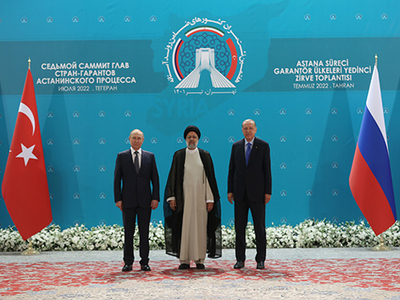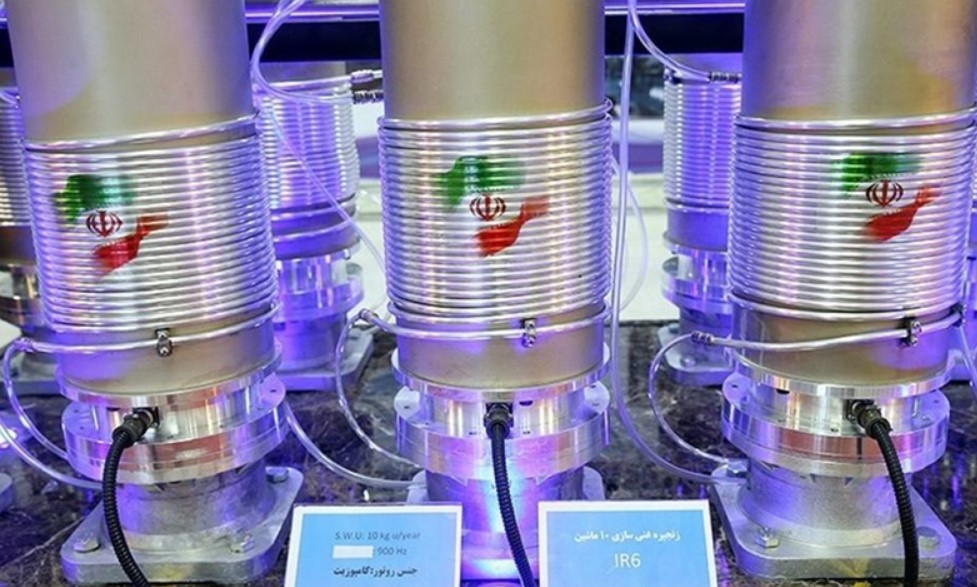 President Joe Biden and Israeli Prime Minister Yair Lapid sign the Jerusalem U.S-Israel Strategic Partnership Joint Declaration last week. |
The U.S. is now facing an assertive Iran that has declared its capacity to build a nuclear weapon after years of evading international inspections and agreements. In addition, it attempted last month to murder Israeli citizens with clandestine operations.
President Joe Biden and Israeli Prime Minister Yair Lapid issued a detailed joint statement July 14, known officially as the Jerusalem U.S-Israel Strategic Partnership Joint Declaration. It reiterates the two countries' resolve as committed allies to address the dangerous prospect of Iran acquiring nuclear weapons.
The phrasing of the text itself is interesting in two ways. First, the United States commits "that it is prepared to use all elements of its national power to ensure that" Iran never acquires a nuclear weapon. Second, it "firmly rejects" the Boycott, Divestment, Sanctions (BDS) movement that targets Israel's very existence as a state.
Iran reacted with its usual aggressive rhetoric. Hardline President Ebrahim Raisi vowed a "harsh and regrettable" response. Iranian officials have issued similar expressions over the years, but now there is a crucial difference: Iran is capable of producing a nuclear weapon to fulfill its threats against Israel, should it decide to do so.
Ending a period of speculation and evasive statements, an Iranian official announced on July 17 in an interview with Al Jazeera TV that Iran is capable of building a nuclear weapon. "It is no secret that Iran has become a nuclear threshold country," said Kamal Kharrazi, chairman of Iran's Strategic Council on Foreign Relations. Still, he added that Tehran "has not made a decision to build an atomic bomb."
He claimed that Iran has carried out extensive drills to be able to strike deep inside Israel "if sensitive (Iranian) installations are targeted." If Tehran moved to build an atomic bomb, then "no one can prevent us," said Mohammad-Javad Larijani, a top adviser to Iranian Supreme Leader Ayatollah Ali Khamenei. "They also know this."
"They swore not to let Iran obtain nuclear weapons," Larijani said, "but American policies, are ancient like Biden. They are powerless in front of us."
Iran's nuclear weapons program has accelerated dramatically in the past three years. The United States withdrew from the Joint Comprehensive Plan of Action (JCPOA) in 2018 and re-imposed a package of severe unilateral sanctions on Iran.
But the moves did not have the desired effect. In 2019, Iran announced that it had increased uranium enrichment beyond the 3.67 percent limit agreed upon in the JCPOA, declaring that it had the capability to enrich uranium to 20 percent. Now, Iran officially admits that it is enriching uranium up to the critical weapons-grade level: "In a few days we were able to enrich uranium up to 60 percent and we can easily produce 90 percent enriched uranium," Kharrazi said Sunday.
If Iran decides "to go for the bomb" it will take just "a few weeks to carry it out," said Bar-Ilan University expert on Israeli national security, Eyal Pinko.
Iran developed the warhead necessary to carry a nuclear bomb years ago, he said. Internal records seized by the Mossad in 2018 also show Iran has the necessary weapons system. And now, it can enrich uranium enough to produce the weapon.
President Biden has repeatedly declared that Iran would never become a nuclear power on his watch and that the last thing the U.S. needs "in that part of the world is a buildup of nuclear capability." But as negotiations over reviving the nuclear deal drag on, Iran's nuclear capabilities continue to grow. The indirect nuclear talks between the United States and the Iranians have outlasted their purpose, as Iran has been steadily using these as a pretext to buy time. More importantly, Biden's diplomatic fixations are dangerously out of date in the light of Iran's new technical nuclear capabilities.
Biden has ruled out Iran's demand to remove the Islamic Revolutionary Guard Corps (IRGC) from the foreign terrorist organizations list but said that the use of force to stop Iran's nuclear ambitions would only be the "last resort."
In a joint appearance with President Biden, Israeli Prime Minister Yair Lapid expressed skepticism about Biden's emphasis on diplomacy.
"Words will not stop them, Mr. President. Diplomacy will not stop them," Lapid said. "The only thing that will stop Iran is knowing that if they continue to develop their nuclear program, the free world will use force."
Israeli officials continue to believe that a return to the 2015 JCPA would endanger the country's security. IDF Chief of Staff Lt. Gen. Aviv Kochavi had stated in a public speech that a "return to the nuclear deal from 2015 or even a similar deal with a few improvements is bad and wrong. It is wrong operationally and strategically. Operationally, because it would again allow at its end, or before, the Iranians to enrich uranium, develop centrifuges, and a weapons capability [taking them up to] breakthrough. Strategically, it would present an intolerable threat to Israel and apparently spark a nuclear arms race in the Middle East. Hence, anything that resembles the current deal or an improved [version of that] agreement is wrong." Israeli Military Intelligence Directorate officers had warned in 2021 that Iran would need approximately just two years to develop a nuclear weapon. It now seems, even these estimates have been surpassed. After Iran declared it is a nuclear threshold country, Kochavi emphasized that Israel may have to act pre-emptively against Iran.
Iranian Terror's Long Reach
Iran's true intentions towards Israel are evident in its constant support for terrorist groups, like Hamas and Islamic Jihad and Hizballah and Islamist groups in Syria, and its own terrorist activities abroad, most recently in Turkey.
Turkey, working with Israeli security officials, thwarted a plot last month to kidnap or kill Israeli tourists and business leaders. The Iranian agents were sent to Turkey with assassination orders by a unit of Iran's Islamic Revolutionary Guard Corps (IRGC), the very one Iran wants removed from the U.S. foreign terrorist organizations list as an incentive to stall its nuclear program.
The Iranian cell consisted of eight agents who stayed at the same Istanbul hotel as their intended victims. Turkish police authorities located three pistols and silencers to be used in the attack.
Iran's covert operations and operational network abroad, especially through Hizballah, has raised concerns not just in the U.S. and Israel, but also among many Arab states. The U.S.-led Law Enforcement Coordination Group, an effort to mobilize Middle Eastern states against Iranian influence, met last month with representatives from Bahrain, Israel, Kuwait, Qatar, Saudi Arabia, the UAE and various European, African and Latin American countries.
 From left, Russian President Vladimir Putin, Iranian President Ebrahim Raisi and Turkish President Tayyip Erdogan met Tuesday in Tehran. |
It seems no matter what the West tries, Iran is continuing its aggressive stance against it. Russia and Turkey are aiding its international position and even its capabilities to undermine Western security.
At this point, the world seems to be approaching that "last resort" Biden spoke about. Will he be prepared to follow through?
 Ioannis E. Kotoulas (Ph.D. in History, Ph.D. in Geopolitics) is Adjunct Lecturer in Geopolitics at the University of Athens, Greece.
Ioannis E. Kotoulas (Ph.D. in History, Ph.D. in Geopolitics) is Adjunct Lecturer in Geopolitics at the University of Athens, Greece.
Copyright © 2022. Investigative Project on Terrorism. All rights reserved.



 Iran's New Interest in Nuclear Talks is Nothing to Celebrate
Iran's New Interest in Nuclear Talks is Nothing to Celebrate
 Iran Using Raisi's "Election" to Pressure U.S. to Re-enter Nuclear Deal
Iran Using Raisi's "Election" to Pressure U.S. to Re-enter Nuclear Deal
 Iran's Atrocious Human Rights Record Must Be Addressed Before New Nuclear Talks
Iran's Atrocious Human Rights Record Must Be Addressed Before New Nuclear Talks